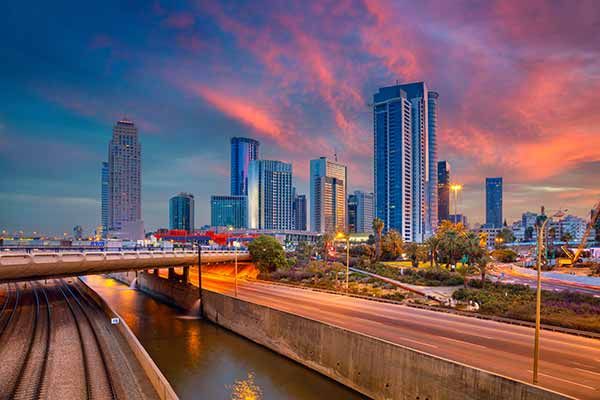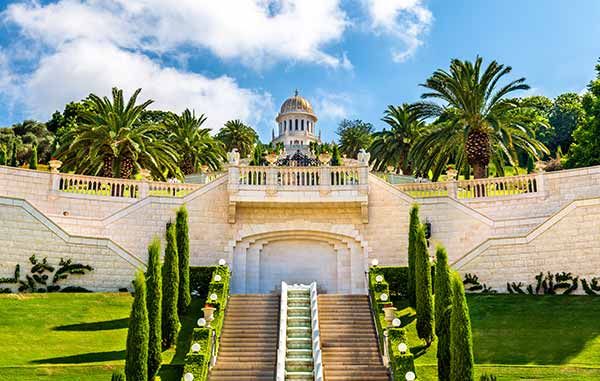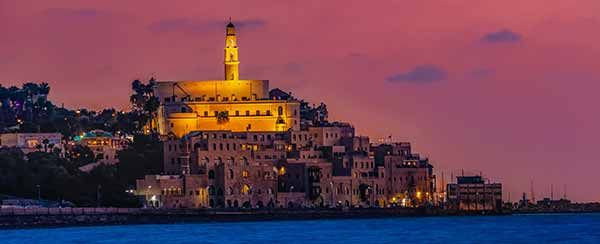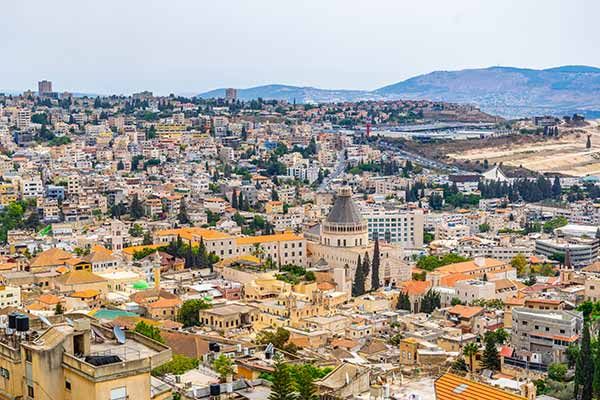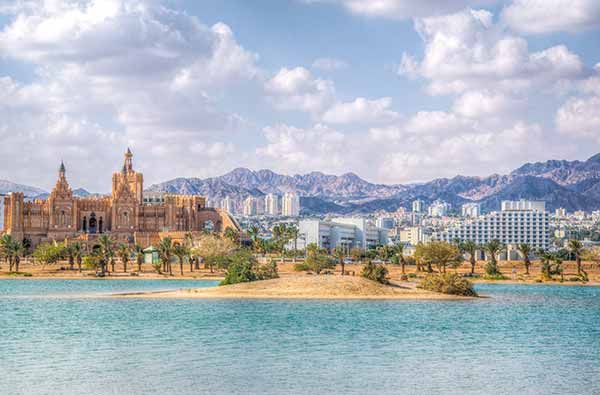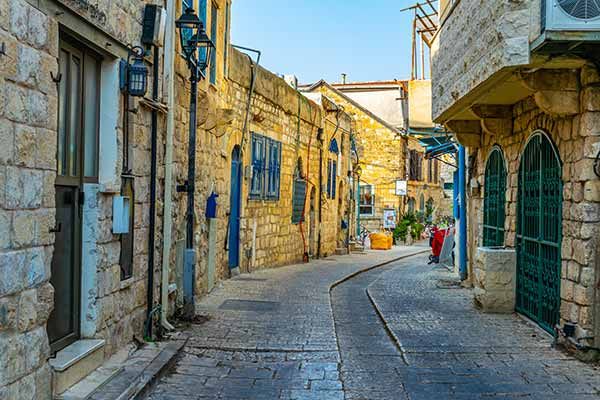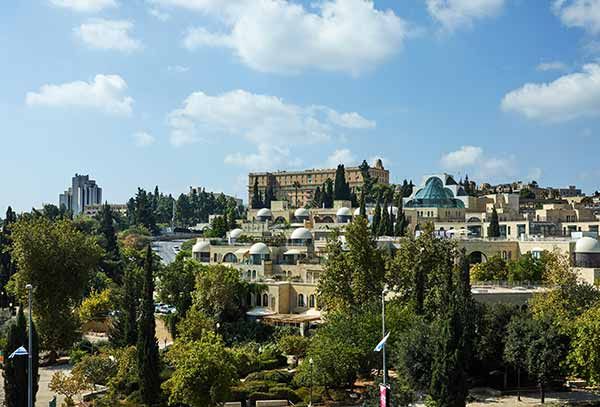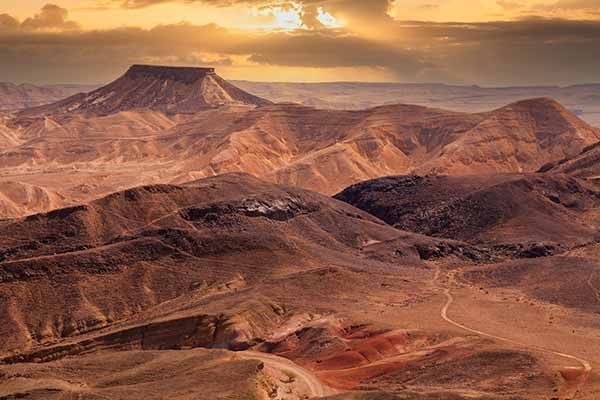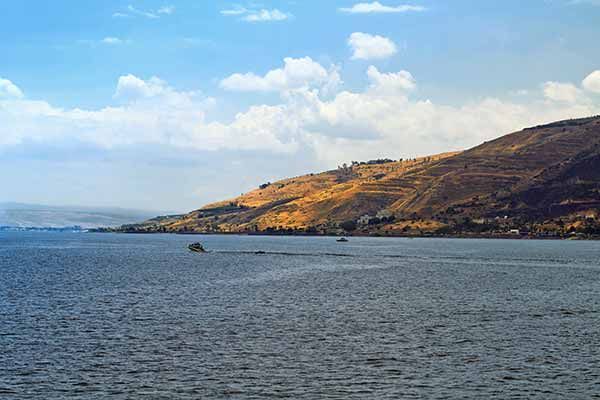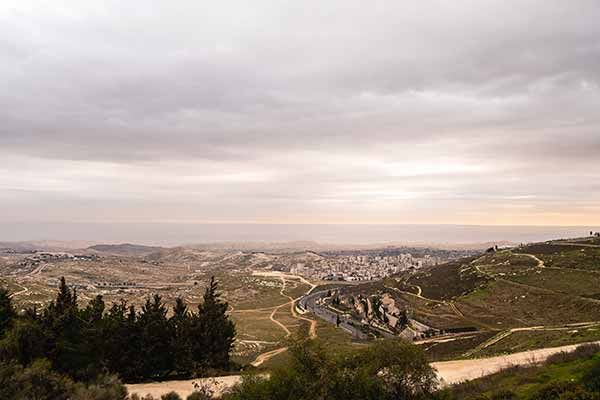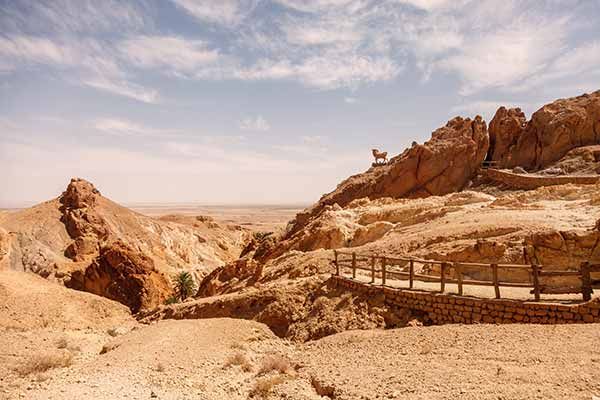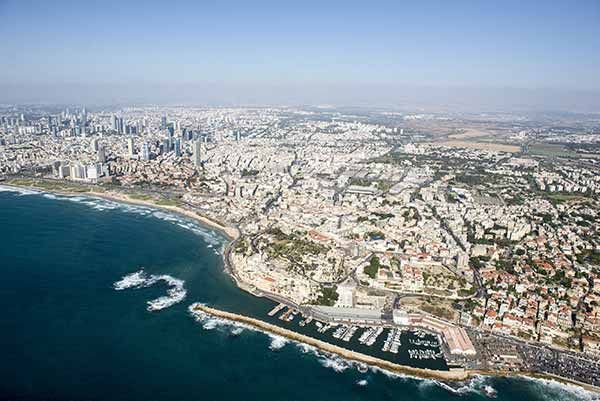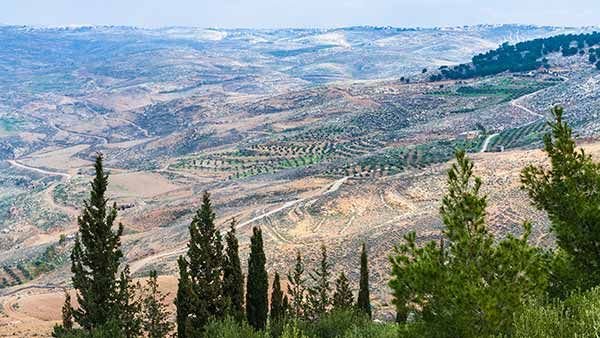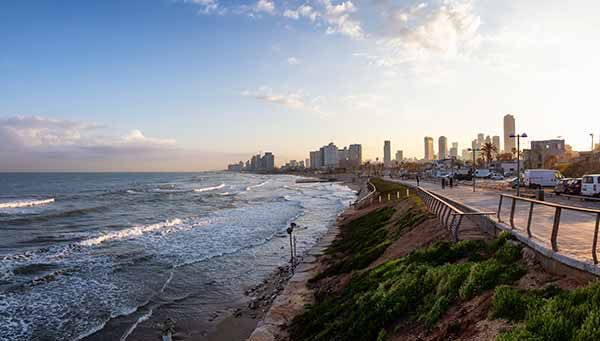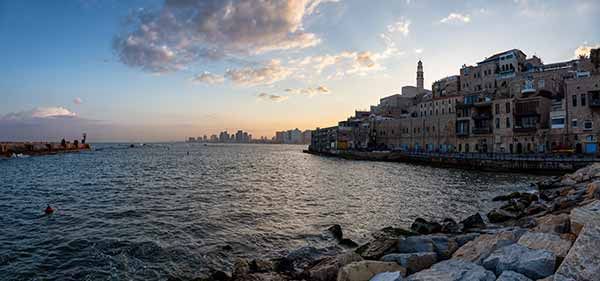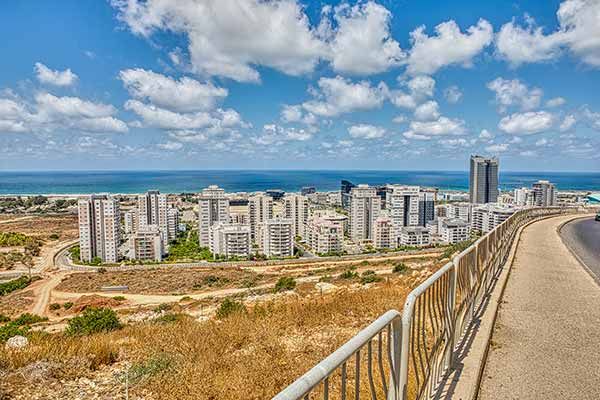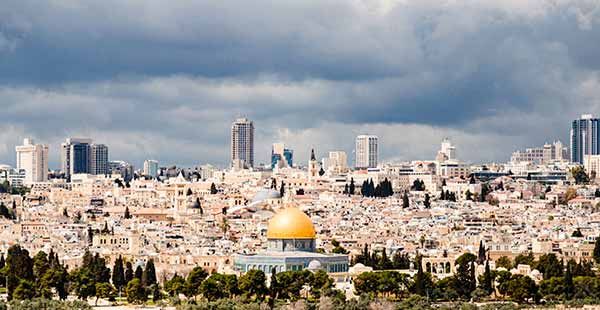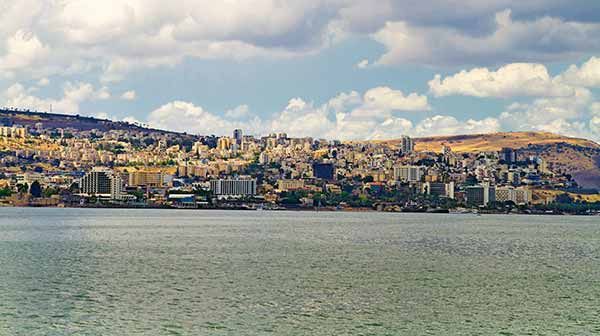Israel
The country is synonymous with ancient history, vibrant markets, stunning beaches, spiritual landmarks, innovative tech, and a buzzing nightlife. It’s compact, complex, and absolutely captivating.
There’s a magnetic energy in Tel Aviv with its art, food, and beach culture; deep spirituality and centuries of history in Jerusalem; breathtaking desert landscapes in the Negev; and lush greenery and wineries in the north. Float in the Dead Sea, hike through dramatic canyons, explore Roman ruins, or relax by the Mediterranean—all within a few hours’ drive. The more you explore Israel, the more layers you discover.
Whether you’re a pilgrim, a backpacker, or a foodie on a mid-range or luxury trip, Israel offers unforgettable experiences. That said, it’s a small country but packed with things to see and do, so give yourself time to take it all in. While Israel can be pricey, smart planning and local eats make it doable without blowing your budget.
Best time to visit Israel
Israel is a fantastic destination year-round, but the best times to visit are during spring (March to May) and autumn (September to November). During these months, the weather is mild and pleasant, with average daytime temperatures ranging from 20–28 °C (68–82 °F). Spring brings blooming wildflowers and ideal conditions for hiking in the desert or exploring historic sites without the scorching heat. Autumn is perfect for beach trips, city sightseeing, and visiting vineyards in the north.
Summer (June to August) is hot and dry, especially in inland areas like Jerusalem or the Negev Desert, where temperatures can climb above 35 °C (95 °F). The Mediterranean coast stays cooler, and Tel Aviv’s beaches and nightlife are in full swing, though this is peak tourist season with higher prices and crowds.
Winter (December to February) sees cooler, wetter weather in the north and along the coast, while the desert remains dry and sunny, making it a great time to explore the south, including Eilat and the Dead Sea. Jerusalem can get chilly, and even occasional snow, but it’s also quiet and atmospheric during this time. Whenever you go, pack for a mix of activities—and bring layers, especially if you're heading to higher altitudes or traveling between regions.
The top Regions
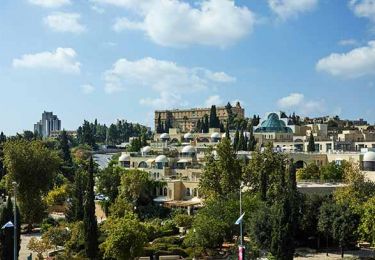
Jerusalem District
As the spiritual and historical heart of Israel, Jerusalem offers world-renowned religious sites such as the Western Wall, the Church of the Holy Sepulchre, and the Dome of the Rock. The city's Old City, with its narrow alleyways and ancient stone architecture, draws visitors from around the world. Beyond its religious significance, Jerusalem also features bustling markets, museums, and viewpoints over the Judean Hills.
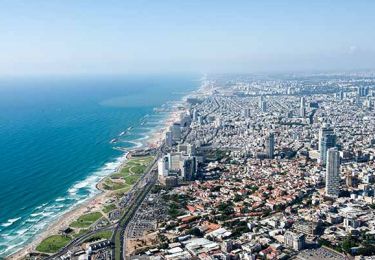
Tel Aviv District
As the spiritual and historical heart of Israel, Jerusalem offers world-renowned religious sites such as the Western Wall, the Church of the Holy Sepulchre, and the Dome of the Rock. The city's Old City, with its narrow alleyways and ancient stone architecture, draws visitors from around the world. Beyond its religious significance, Jerusalem also features bustling markets, museums, and viewpoints over the Judean Hills.
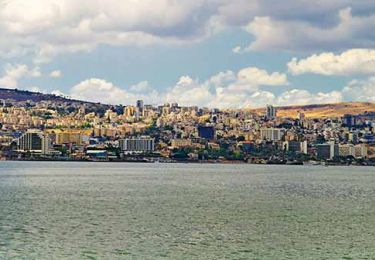
Northern District (Galilee)
This lush, green region is ideal for nature lovers and history buffs alike. Highlights include the Sea of Galilee, Nazareth, and the Golan Heights. Visitors can hike through forests, explore ancient ruins, and enjoy local wines at boutique wineries. The Galilee also offers a mix of Jewish, Christian, Druze, and Arab communities, giving it a rich cultural diversity.
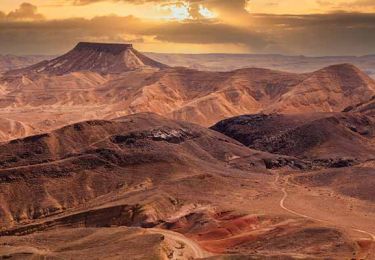
Southern District (Negev Desert & Eilat)
Covering more than half of Israel’s land area, the Negev is a dramatic desert region featuring rugged canyons, crater landscapes like Makhtesh Ramon, and ancient Nabatean sites. At the southern tip lies Eilat, a Red Sea resort city known for snorkeling, diving, and year-round sunshine. The region is a haven for adventure travelers and those looking to escape the crowds.
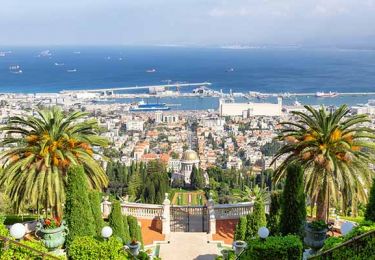
Haifa District
Nestled between the sea and Mount Carmel, Haifa is a scenic port city known for the stunning Bahá’í Gardens, its mixed Jewish and Arab population, and a laid-back atmosphere. The surrounding region includes the Carmel National Park and picturesque coastal towns like Zikhron Ya'akov and Akko (Acre), a UNESCO World Heritage Site rich in Crusader and Ottoman history.
The top Cities
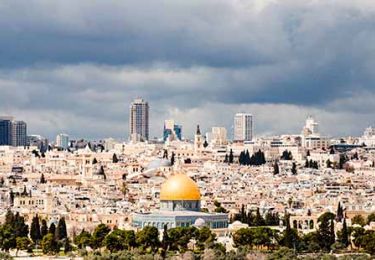
Jerusalem
The ancient and spiritual heart of Israel. Home to key religious sites like the Western Wall, Dome of the Rock, and Church of the Holy Sepulchre. Tourists are drawn to the Old City’s labyrinthine alleys, world-class museums (like Yad Vashem), vibrant open-air markets, and the emotional depth of this complex, multicultural city.
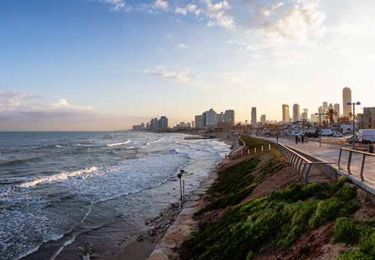
Tel Aviv
Israel’s most modern and liberal city. Known for its white Bauhaus architecture, lively beach scene, nightlife, culinary innovation, and contemporary art. Tourists love the contrast between bustling Tel Aviv and ancient Jaffa, and it’s a top destination for digital nomads, LGBTQ+ travelers, and sunseekers.
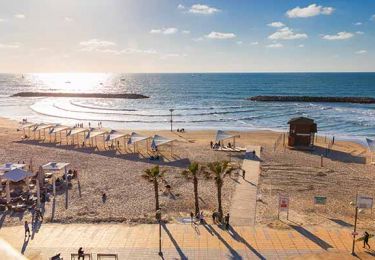
Herzliya
A tech and finance hub just north of Tel Aviv, Herzliya is known for its startup scene, luxury hotels, and a marina full of yachts. It’s ideal for business travelers who want to enjoy upscale dining, modern shopping malls, and beautiful Mediterranean beaches.
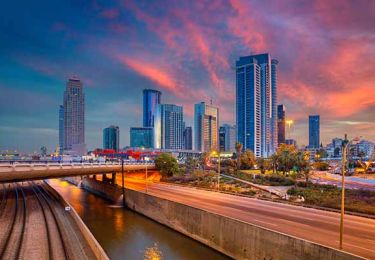
Ramat Gan
A suburb of Tel Aviv, this city is important for diamond trading and business tourism. Tourists can explore Safari Ramat Gan (a large urban safari park) and relax in large green spaces like the National Park of Ramat Gan.
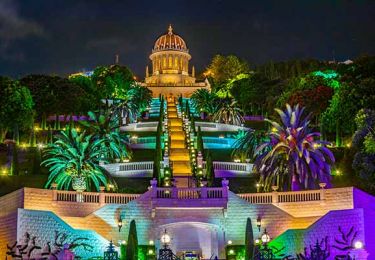
Haifa
Built on the slopes of Mount Carmel with sweeping views over the sea, Haifa is famous for the Baháʼí Gardens, cultural coexistence, and mountain-to-sea landscapes. It’s less touristy, with an authentic feel, and a great base for exploring northern Israel.
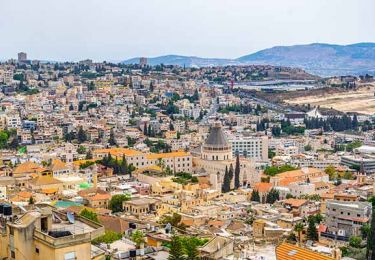
Nazareth
The childhood home of Jesus, Nazareth is a key pilgrimage site with highlights such as the Basilica of the Annunciation and vibrant Arab-Israeli culture. Wander its old souks and enjoy local Middle Eastern cuisine.
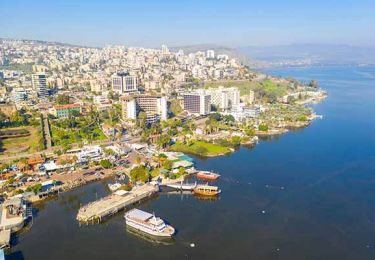
Tiberias
Located on the shores of the Sea of Galilee, this city blends religious significance with natural beauty. It's a popular base for Christian pilgrimages, water activities, and exploring ancient ruins and hot springs.
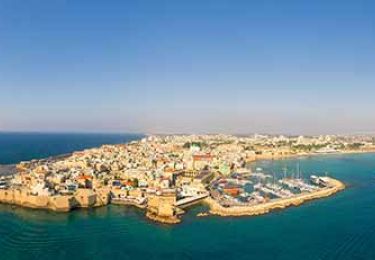
Akko (Acre)
A UNESCO World Heritage Site, Akko offers well-preserved Crusader ruins, Ottoman architecture, and colorful souks. It's atmospheric, walkable, and perfect for history lovers.
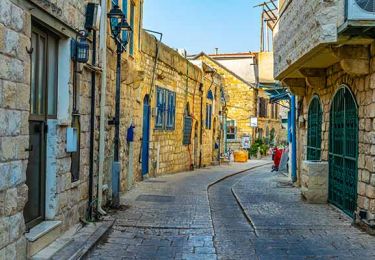
Safed (Tzfat)
One of Judaism's four holy cities and the heart of Kabbalah (Jewish mysticism), Safed is filled with stone alleyways, galleries, and a serene, mystical atmosphere. A favorite for spiritual travelers and artists alike.
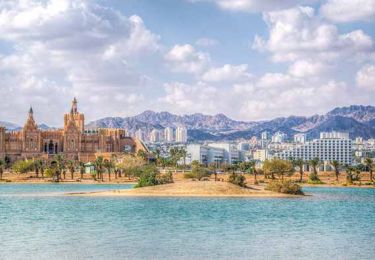
Eilat
Israel’s southernmost city, located on the Red Sea. A paradise for snorkelers, divers, and sun-lovers with coral reefs, desert landscapes, and year-round sunshine. Also a great base for desert hikes or trips to Petra (Jordan).
Must see locations
Tel Aviv
Nazareth
Eilat
Jerusalem
Haifa
Akko (Acre)
Herzliya
Tiberias
Ramat Gan
Safed (Tzfat)
The best tours
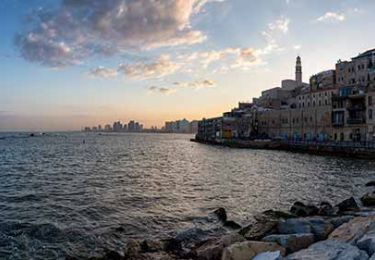
11 Tourist Places to Visit in Israel
This video ranks the top 11 places to visit in Israel, starting with historic and religious sites like Jerusalem, Nazareth, and Haifa. It highlights scenic destinations such as Mount Tabor, the Red Canyon near Eilat, and Timna Park. Other must-sees include Tel Aviv’s nightlife, the biblical Valley of Elah, the floating wonders of the Dead Sea, and ancient Acre (Akko). The top destination is the Sea of Galilee, known for its spiritual, historical, and natural beauty.

Best Things To Do In Tel Aviv
The video documents a visit to Tel Aviv, Israel, starting with a $5 bus ride from Jerusalem. The host stays at a $75 beachfront capsule hotel and explores the historic port city of Jaffa, known for its markets, art, and ancient streets. He visits the old flea market, waterfront, and iconic sites like the suspended orange tree. Tel Aviv is compared to San Diego for its beach culture and fitness vibe. The city has efficient public transport, plenty of beaches, and a vibrant atmosphere both day and night.
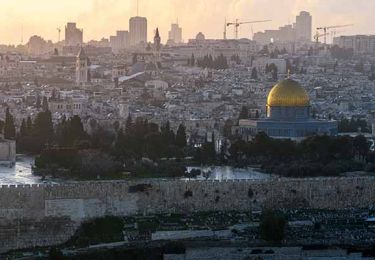
Best Things to Do in Jerusalem
This travel guide from Island Hopper TV explores Jerusalem's rich history and religious significance, visiting major sites like the Jaffa Gate, Church of the Holy Sepulchre, Western Wall, and Via Dolorosa. The video also includes a journey to Bethlehem via the West Bank, with a visit to Jesus' birthplace at the Church of the Nativity. Other highlights include the Mount of Olives, City of David, Hezekiah's Tunnel, and Mount Zion, showcasing Jerusalem's diverse quarters and ancient roots.
Important Travel Information
For someone planning to travel to another country, having the right information can make the trip smoother and more enjoyable. Here are the most important travel details to consider:
1. Visa Requirements for Israel
Israel’s visa policy varies depending on your nationality and purpose of visit.
Short Stays (Up to 90 Days)
- Visa-Free Travel: Citizens from over 90 countries—including the EU, USA, Canada, Australia, New Zealand, Japan, and South Korea—can enter Israel visa-free for up to 90 days for tourism or business.
- Visa Required: Travelers from countries not on the visa exemption list must obtain a tourist visa (B/2) before arriving. Applications are submitted through the nearest Israeli embassy or consulate.
- Electronic Entry Form (Beta System): Israel is rolling out a digital entry form in place of the traditional passport stamp. Upon entry, a paper slip is issued instead, which you should keep for the duration of your visit.
Long Stays (More than 90 Days)
- For work, study, or immigration, you must apply for a long-term visa or permit (e.g., student visa, work visa, Aliyah/immigration visa) through official government channels before traveling.
2. Passport Validity Requirements
Your passport must be valid for at least 6 months from your date of entry into Israel.
✈ Tip: Airlines may refuse boarding if your passport has less than 6 months’ validity, so check before booking your flight.
Israel does not stamp passports anymore to avoid issues with future travel to certain countries. Instead, a separate entry slip is provided.
3. Vaccination & Health Requirements
Mandatory Vaccinations
- Yellow Fever: Required only if arriving from a country where Yellow Fever is endemic. A valid vaccination certificate is necessary in such cases.
- COVID-19: As of 2024, no COVID-19 vaccination, testing, or quarantine is required to enter Israel.
Recommended Vaccinations
- Hepatitis A & B
- Tetanus, Diphtheria, Pertussis
- Measles, Mumps, Rubella (MMR)
- Rabies (if planning outdoor activities or animal contact)
- Polio (especially for travelers from or to countries with polio outbreaks)
💊 Health Tip: Israel has excellent healthcare, but travel health insurance with emergency coverage is strongly recommended.
4. Customs Regulations: What You Can & Cannot Bring
Duty-Free Allowances (for travelers over 18):
- Alcohol:
- 1 liter of spirits AND
- 2 liters of wine
- Tobacco:
- 250 grams total (cigarettes, cigars, or loose tobacco)
- Gifts:
- Up to $200 USD in value
Currency Declaration:
- Must declare if carrying more than NIS 50,000 (~€12,000 / $13,500) or equivalent in cash, checks, or other financial instruments when entering or exiting Israel.
Prohibited & Restricted Items
❌ Drugs, including medical marijuana
❌ Weapons, ammunition, pepper spray, and self-defense items without a license
❌ Pornographic materials
❌ Fresh produce, plants, and certain animal products
❌ Drones, unless declared and registered with the Israeli Civil Aviation Authority
🚨 Tip: Israel takes airport and border security very seriously. Always declare restricted items and cooperate with customs officers.
5. Border Controls & Security Checks
Israel is not part of the Schengen Area, and strict border controls apply.
Expect checks for:
- Purpose of visit (you may be questioned)
- Return or onward ticket
- Proof of accommodation
- Sufficient funds for your stay
- Travel history, especially if you’ve visited certain Middle Eastern or Muslim-majority countries (e.g., Iran, Lebanon, Syria)
📌 Final Tip: Always consult your local Israeli embassy or the Israel Ministry of Foreign Affairs website for the most current and official travel entry information before departure.
1. Local Currency
Currency: Israeli New Shekel (ILS, ₪)
Subunits: 1 Shekel = 100 Agorot
Coins: 10 agorot, ½ shekel, 1 shekel, 2 shekels, 5 shekels, 10 shekels
Banknotes: ₪20, ₪50, ₪100, ₪200
💰 Fun Fact: Israeli banknotes feature color-coded Hebrew text, Braille markings for the visually impaired, and national figures like Golda Meir and David Ben-Gurion.
2. Exchange Rate & Best Places to Exchange Money
Exchange Rate (approximate):
1 USD ≈ 3.70 ILS
1 Euro ≈ 4.00 ILS
(Rates fluctuate daily—always check before exchanging.)
Best Places to Exchange Money:
- Licensed currency exchange offices (especially in cities and markets – often better rates than banks)
- Banks (secure but may charge a fee or offer less favorable rates)
- ATMs (usually offer the best real-time rates but check for withdrawal fees from your home bank)
💱 Tip: Avoid exchanging currency at the airport or hotels unless necessary, as they usually offer poorer rates. Use supervised exchange kiosks or ATMs for better value.
3. Availability of ATMs & Card Payments
ATMs:
- Widely available throughout the country, including in most towns and cities.
- English interface common.
Dispense Israeli Shekels only. - Most accept international debit and credit cards (Visa, Mastercard, and some American Express).
Card Payments:
- Credit and debit cards are accepted nearly everywhere—restaurants, cafes, shops, public transport, taxis, and tourist sites.
- Contactless payments (NFC) are common and supported for small and large transactions.
- Mobile wallets like Apple Pay and Google Pay are increasingly accepted.
💳 Cash Tip: While Israel is mostly cashless-friendly, it’s still handy to carry small cash amounts for markets, buses in remote areas, or small purchases in the countryside.
4. Tipping Culture
Restaurants:
- A 10–15% tip is customary for good service.
- Some places include a service charge in the bill—check before tipping extra.
Cafes & Bars:
- Rounding up the bill or leaving small change is appreciated but not mandatory.
Taxis:
- Tipping not required, but rounding up to the nearest 5 or 10 shekels is common.
Hotels:
- Tip ₪5–10 per bag to porters and ₪10–20 per day for housekeeping.
Tours & Guides:
- ₪20–50 per person per day is customary for group tours.
- For private guides, ₪100+ per day is appropriate.
💸 Tipping Tip: Tipping in Israel is expected in the service industry, especially in restaurants and tours. Always check if the “service” is included before adding more.
1. Official Language(s) & Basic Phrases
Official Languages: Hebrew, Arabic
Widely Spoken Language: English (especially in tourist areas and cities)
Basic Hebrew Phrases to Know:
- Hello = Shalom
- Thank you = Toda
- Please = Bevakasha
- Goodbye = Lehitraot
- Excuse me / Sorry = Slicha
- Where is the bathroom? = Eifo ha’sherutim?
- How much does it cost? = Kama ze oleh?
🗣 Cultural Tip: While most Israelis speak English quite well, learning a few Hebrew phrases will earn you a smile. Hebrew is read right to left, so signage may look unusual at first, but many signs are also in English.
2. English Proficiency Level
Ease of Communication: Generally easy
English is widely spoken, especially in Tel Aviv, Jerusalem, Haifa, and other tourist destinations. Most hotel staff, guides, and shop owners in major cities speak conversational English.
In rural or religious areas, English proficiency may be more limited, so having a translation app can help.
🎯 Tip: Most street signs, public transport info, and menus in urban areas are available in Hebrew, Arabic, and English.
3. Useful Translation Apps
- Google Translate: Excellent for Hebrew ↔ English translation, including real-time camera translation (for signs, menus, etc.).
- iTranslate: Great for accessing predefined phrases and useful offline functionality.
- SayHi: Good for voice-to-voice conversations with locals.
📲 Tip: Download Hebrew and Arabic offline packs before your trip, in case you find yourself in areas with poor signal or limited English speakers.
4. Local SIM Card or eSIM Options
Local SIM Cards:
- Partner (formerly Orange): Good nationwide coverage, reliable service.
- Cellcom: One of the largest providers; strong coverage and reasonable prepaid packages.
- HOT Mobile: Budget-friendly, often offers large data allowances for tourists.
- Pelephone: Popular option with tourist SIMs at the airport and major cities.
eSIM Options:
- Airalo: Offers affordable Israeli eSIMs, including short-term tourist plans.
- Holafly: Unlimited data plans available for Israel with fast setup.
- bGlobal: eSIM provider with coverage in Israel.
Where to Buy:
- Ben Gurion Airport kiosks (convenient but sometimes pricier)
- Mobile provider stores in malls and city centers
- Online, with delivery or activation upon arrival
📱 Tip: Expect tourist SIM plans from ₪50–100 (approx. €12–25) with 5–20 GB of data, local calls, and text. Most plans include free incoming calls. Prepaid SIMs are cheaper and more convenient than roaming with your home carrier.
1. Public Transport System
Trains:
- Israel Railways connects major cities such as Tel Aviv, Jerusalem, Haifa, Be’er Sheva, and Nahariya.
- The Tel Aviv–Jerusalem high-speed train is fast, clean, and very popular with tourists.
- Trains are modern, air-conditioned, and offer free Wi-Fi.
Light Rail / Metro:
- Jerusalem Light Rail is a modern tram system running through the city, connecting the Old City, downtown, and residential neighborhoods.
- Tel Aviv Metro is under construction, but the Red Line (light rail) launched in 2023 and is now operational in parts of the city.
Buses:
- An extensive national bus network serves all cities, towns, and rural areas.
- Egged, Dan, and Kavim are the main operators.
- Rav-Kav is the national reloadable transport card—used on buses, trains, and light rail.
- In most areas, buses don’t run from Friday afternoon to Saturday evening due to Shabbat.
Tuk-tuks / Rickshaws:
- Not common or used for transport in Israel. You might occasionally see electric tourist carts in Jerusalem’s Old City.
🚇 Tip: Download apps like Moovit or Israel Railways for real-time schedules, route planning, and fare info.
2. Taxi & Ridesharing Options
Traditional Taxis:
- Widely available in all cities and at airports.
- Always ask for the meter ("Moneh" in Hebrew), or agree on a fare in advance.
- Taxis can be hailed on the street or ordered via apps.
Ridesharing Apps:
- Gett: Most popular taxi-hailing app in Israel. Used in Tel Aviv, Jerusalem, Haifa, and more.
- Yango: Available in major cities with competitive pricing.
- Uber: Not available in Israel as a regular rideshare; limited use only with licensed taxis via the app.
🚖 Tip: Taxis don’t always accept credit cards—cash or local payment apps like Bit are preferred.
3. Driving Rules
Driving Side: Right-hand side of the road.
License Requirements:
- Tourists can drive with a valid national driver’s license for up to 12 months.
- International Driving Permit (IDP) is recommended if your license is not in English, Hebrew, or Arabic.
Key Road Rules:
- Seatbelts are mandatory for all passengers.
- Using a mobile phone while driving is illegal unless using a hands-free device.
- Road signs are in Hebrew, Arabic, and English.
- Roundabouts are common—traffic inside has right of way.
- Speed limits: 50 km/h in cities, 80–90 km/h on roads, 100–120 km/h on highways.
🚗 Tip: Use apps like Waze (developed in Israel!) or Google Maps for real-time traffic and navigation. Parking in cities like Tel Aviv can be tough—look for blue-and-white marked spots or use apps like Pango and CelloPark for paid parking.
4. Bike / Scooter Rental Options
Bike Rentals:
- Tel-O-Fun in Tel Aviv: self-service bike-sharing stations around the city.
- Jerusalem and Haifa offer local bike rental shops and limited city-run programs.
E-Scooter Rentals:
- Widely available in Tel Aviv, Haifa, and parts of Jerusalem.
- Main providers: Bird, Lime, Wind, and Yango Wind.
- You must be 18+ and have a valid driver’s license (physical or digital).
- Scooters are dockless and unlocked via mobile app.
Guided Tours:
- Many cities offer bike or e-scooter tours through historical or scenic areas—perfect for active travelers.
🚴 Tip: Helmets are required by law for riders under 18, and strongly recommended for all. Stick to bike lanes where available, and ride responsibly.
1. Best Neighborhoods for Tourists
Tel Aviv:
- Neve Tzedek: One of Tel Aviv’s oldest and most charming neighborhoods. Walkable, full of boutique shops, art galleries, and cafes—perfect for couples or solo travelers.
- Florentin: Trendy and artistic with a bohemian vibe. Great for nightlife, street art, and younger travelers looking for hostels or affordable stays.
- Old North (Tzafon HaYashan): Safe, residential, and close to beaches. Ideal for families and travelers seeking a quieter but central location.
- Jaffa (Yafo): Historic seaside district with winding alleys, a vibrant flea market, and beautiful sea views. Perfect for those wanting a mix of culture and charm.
Jerusalem:
- German Colony (Emek Refaim): Leafy, upscale area with cafes, restaurants, and easy access to Old City via public transport. Great for families or long-term stays.
- City Center / Ben Yehuda Street: Lively and walkable, near shops, markets, and public transport. Ideal for first-time visitors who want a central base.
- Rehavia: Quiet and elegant neighborhood close to major museums and cultural institutions—great for those seeking peace near the action.
- East Jerusalem (near Damascus Gate): Budget-friendly and culturally rich. Stay here for proximity to the Old City, but research reviews to ensure comfort and safety.
Haifa:
- German Colony: Right below the Bahá’í Gardens, this area is full of restaurants, walkable streets, and boutique hotels.
- Carmel Center: Located on Mount Carmel with sweeping views, shopping, and easy access to public transport and cultural attractions.
🏘 Tip: Choose neighborhoods close to light rail stations or bus hubs for easier access to top sites—especially in Jerusalem and Tel Aviv.
2. Hotel, Hostel, or Airbnb Options
Hotels:
- Budget (₪150–₪350/night | €40–€85): Abraham Hostel (Tel Aviv & Jerusalem), Little House in Rehavia (Jerusalem), Port and Blue (Tel Aviv).
- Mid-range (₪350–₪700/night | €85–€170): Prima Hotels, Center Chic (Tel Aviv), Harmony Hotel (Jerusalem), Colony Hotel (Haifa).
- Luxury (₪700+/night | €170+): The Norman (Tel Aviv), King David Hotel (Jerusalem), The Efendi Hotel (Akko), Setai Sea of Galilee.
Hostels:
- Budget-friendly (₪100–₪200/night | €25–€50): Abraham Hostel (highly rated), The Post Hostel (Jerusalem), Haifa Hostel.
- Most offer private rooms, kitchens, and city tours—great for social travelers.
Airbnb:
- Ranges from ₪200–₪600+/night (€50–€150+) depending on location, season, and size.
- Common in Tel Aviv, Jerusalem, and northern countryside areas.
- Great for longer stays, families, or travelers wanting a local feel.
Booking Platforms:
- Booking.com (for hotels and guesthouses)
- Airbnb (apartments, private rooms, family stays)
- Hostelworld (hostels and social stays)
- Expedia (hotels + flights packages)
🏨 Tip: Book early for Passover, summer (June–August), and Jewish holidays, as prices rise and availability drops quickly.
3. Cultural Stay Recommendations
Traditional Homestays & Guesthouses:
- Zimmers (rural guesthouses): Common in the Galilee, Golan Heights, and Negev Desert. Often run by families with homemade breakfasts, gardens, and local experiences.
- Recommended: Barbakfar, Pnina BaMidbar, or Moshav guesthouses for authentic countryside stays.
Boutique Hotels:
- Villa Brown Jerusalem: Stylish boutique hotel in a historic 19th-century villa with rooftop views.
- Drisco Hotel (Tel Aviv): Historic building from the Ottoman period turned into a luxurious, design-forward stay.
- Efendi Hotel (Akko): Lavish boutique hotel in a restored Ottoman palace, combining luxury and historic charm.
Unique Experiences:
- Desert lodges in the Negev (e.g., Kfar Hanokdim, Shaharut Resort): Stay in Bedouin tents or luxury eco-lodges surrounded by desert landscapes.
- Kibbutz Guesthouses: Spend a night or two on a kibbutz (collective community) to experience a unique part of Israeli culture and history.
🏡 Tip: Search terms like “zimmer,” “kibbutz stay,” or “boutique hotel Israel” when booking to discover authentic and memorable accommodations.
1. Crime Levels & Travel Advisories
General Safety:
Israel is generally safe for tourists, especially in major cities like Tel Aviv, Jerusalem, and Haifa. Crime rates are relatively low, and violent crime against tourists is rare. Most visits are incident-free.
Common Risks:
- Pickpocketing: Can occur in crowded areas such as the Old City of Jerusalem, Mahane Yehuda Market, central bus stations, and beaches in Tel Aviv.
- Scams: Uncommon but watch for overpriced taxi rides (always ask for the meter), fake charity collectors, or unofficial guides offering "tours" in tourist-heavy areas.
- Security Incidents: There can be tensions or demonstrations related to political or religious issues. These are usually localized, and authorities respond quickly.
Travel Advisories:
Always check your country’s official travel advisory site (e.g., U.S. Department of State, UK’s FCDO, Germany’s Auswärtiges Amt) for the latest guidance.
Certain border areas (e.g., near Gaza or parts of the West Bank) may have restricted access or advisories in place.
🚨 Safety Tip: Stay informed via local news or hotel staff, avoid protests or large gatherings, and carry ID at all times (a copy of your passport is usually sufficient).
2. Emergency Contacts
Police, Ambulance, Fire Brigade:
📞 100 – Police
📞 101 – Ambulance (Magen David Adom)
📞 102 – Fire Department
📞 911 – Also works across all emergency services
Embassies:
Most foreign embassies are located in Tel Aviv, with consular offices in Jerusalem.
Check your embassy’s website for emergency contact numbers and consular services.
🆘 Tip: Register with your embassy’s travel registration program (like the U.S. STEP program) if available, and save the emergency numbers on your phone before traveling.
3. Local Laws & Customs
Dress Codes:
- Casual wear is fine in most urban areas like Tel Aviv.
- In religious sites (e.g., the Western Wall, churches, mosques), dress modestly: cover shoulders and knees; some locations may require head coverings.
- In ultra-Orthodox neighborhoods, modest clothing is strongly advised to avoid unwanted attention or confrontation.
Alcohol Restrictions:
- Legal drinking age is 18.
Alcohol is widely available in bars, restaurants, and supermarkets, especially in secular areas. - In religious neighborhoods and during holidays like Passover or Yom Kippur, alcohol may be less accessible or discouraged.
- Public drinking is not illegal but may be frowned upon in certain religious areas.
Photography Rules:
- Photography is allowed in most public places, but avoid taking pictures of military personnel, security checkpoints, and government buildings.
- Be respectful in religious areas; always ask before photographing people, especially in orthodox communities or during prayer.
📸 Tip: When visiting holy sites, look for posted rules on photography—some prohibit flash or any photos entirely.
4. Health & Hygiene Considerations
Tap Water Safety:
- Tap water in Israel is safe to drink throughout the country, including in hotels and restaurants.
- Bottled water is widely available, but not necessary unless you prefer it.
Medical Facilities:
- Israel has high-quality healthcare with modern hospitals and clinics.
- Emergency care is available to everyone, but non-emergency treatment must be paid for if you are not covered by a local health provider.
- Travel insurance with medical coverage is highly recommended.
Pharmacies:
- Known as “Beit Merkaz Refui” or simply “Pharm”, pharmacies are widespread and well-stocked.
- Popular chains include Super-Pharm and New-Pharm, offering over-the-counter medication and basic health services.
- Many pharmacists speak English.
💊 Health Tip: Bring essential medications in original packaging and a doctor’s note or prescription for any controlled substances. Pharmacies in cities are open late, but rural locations may have limited hours.
1. Typical Weather Conditions
General Climate:
Israel has a Mediterranean climate with hot, dry summers and cool, wet winters. Weather varies significantly between coastal areas, deserts, and mountainous regions.
Seasons:
- Spring (March to May): Warm and pleasant with blooming wildflowers, especially in the Galilee and Negev. Temperatures range from 18°C to 28°C (64°F to 82°F).
- Summer (June to August): Hot and dry, especially inland and in desert areas. Tel Aviv averages 30°C (86°F), while Eilat and the Negev can reach 40°C (104°F).
- Autumn (September to November): Warm, dry, and less crowded. Daytime temps range from 20°C to 30°C (68°F to 86°F), with cooler evenings.
- Winter (December to February): Mild on the coast, cooler in Jerusalem and the north. Tel Aviv sees 10°C to 18°C (50°F to 64°F), while Jerusalem can drop to 5°C (41°F) and may occasionally see snow.
Rainfall:
Rain falls mainly from November to March, primarily in the north and center. Southern Israel and Eilat are arid year-round.
☀️ Tip: Pack sunscreen and a hat in summer; bring layers and a light rain jacket if visiting in winter.
2. Best Months to Visit
High Season (April to June, September to October):
Ideal for sightseeing, beach trips, hiking, and festivals.
- Spring and fall offer mild temperatures, blooming landscapes, and less humidity than summer.
- Expect more tourists during Jewish holidays like Passover and Sukkot, with higher hotel prices.
Shoulder Season (March, early November):
Great weather and fewer crowds, especially good for city visits, cultural tours, and nature walks.
Low Season (July–August, December to February):
- Summer is extremely hot, particularly inland and in the desert, but great for Eilat and Mediterranean beaches.
- Winter is cooler and wetter but a good time to visit Jerusalem, Tel Aviv, and museums without the crowds.
📅 Tip: May and October offer the perfect balance of great weather and manageable crowds, especially for first-time visitors.
3. Natural Disaster Risks
Hurricanes/Typhoons:
❌ None. Israel is not in a hurricane or typhoon zone.
Earthquakes:
✅ Possible, but infrequent. Israel sits on a minor fault line, and small tremors can occur. Major earthquakes are rare but not impossible.
Flash Floods:
⚠️ Can occur in the Negev Desert and Judean hills during winter rains. These can happen quickly and be dangerous in dry riverbeds (wadis).
Avoid hiking in desert areas if rain is forecasted.
Other Risks:
- Heatwaves in summer (especially inland and desert regions).
- Dust storms (known as sharav) can reduce air quality in spring or fall.
🌦 Tip: Always check local weather apps or Israel Meteorological Service before planning hikes or desert trips. Avoid wadis and canyons during or after rain.
1. Local Dishes to Try
- Falafel: Deep-fried balls of ground chickpeas, served in pita with salad, tahini, and pickles. A staple of Israeli street food—crispy, satisfying, and vegetarian-friendly.
- Shakshuka: A popular breakfast or brunch dish made with poached eggs in a spicy tomato and pepper sauce, often served with fresh bread to soak up the sauce.
- Sabich: A pita stuffed with fried eggplant, hard-boiled egg, tahini, Israeli salad, and pickles. Originally from Iraqi-Jewish cuisine, now a street food favorite.
- Hummus & Pita: Creamy hummus served warm or cold, topped with olive oil, herbs, and sometimes chickpeas or meat. Eaten as a meal with fluffy, fresh pita.
- Jachnun: A slow-cooked Yemenite Jewish dish made of rolled dough, baked overnight and served with tomato sauce and hard-boiled eggs. Typically eaten on Shabbat mornings.
🍽 Tip: Visit a local shuk (market) like Carmel Market (Tel Aviv) or Mahane Yehuda (Jerusalem) for a truly authentic food experience.
2. Dietary Restrictions
Vegetarian Options:
Very accessible across Israel. Many dishes like falafel, hummus, shakshuka, and sabich are naturally vegetarian. Tel Aviv is considered one of the world’s most vegan-friendly cities.
Halal Options:
Available in Arab-majority towns and neighborhoods, particularly in East Jerusalem, Nazareth, and parts of Haifa and Jaffa. Restaurants are usually marked with halal certification or can be confirmed with staff.
Kosher Options:
Widely available throughout Israel. Many restaurants are certified kosher, especially in Jerusalem and religious neighborhoods. Kosher laws also influence opening hours—some places close for Shabbat (Friday sunset to Saturday sunset).
🌱 Tip: Look for menu symbols or ask staff—most Israelis speak English and are helpful with dietary needs.
3. Street Food Safety
General Safety:
Street food in Israel is generally safe and clean, with many vendors held to high hygiene standards.
Tips for Avoiding Food Poisoning:
- Eat where locals are queuing—high turnover means fresher food.
- Make sure dishes like meat shawarma or grilled kebabs are served hot and well-cooked.
- Avoid uncovered sauces or dips sitting in the sun.
- Be cautious with fresh juices from carts—check for cleanliness.
🌯 Tip: Bring hand sanitizer, and stay hydrated—especially when touring markets or eating outdoors in hot weather.
4. Restaurant Etiquette
Eating Customs:
- In restaurants, wait to be seated; in cafes or street kiosks, order at the counter.
- It’s polite to say “toda” (thank you) and “bevakasha” (please) when ordering.
- Meals often start with complimentary salads or bread, especially in Middle Eastern-style restaurants.
Service Charges:
- Some restaurants add a 10–15% service charge to the bill—check your receipt.
- If not included, it’s customary to tip 10–15% for good service.
- Tipping is not expected in fast-food places or kiosks.
🍴 Tip: If unsure, ask: “Is service included?” Credit cards are widely accepted, but cash is often preferred for tips.
1. Average Daily Budget
Backpacker: ₪200–₪350/day (€50–€85)
Stay in hostel dorms, eat at street food stalls or falafel stands, use buses or trains, and visit free attractions like beaches, markets, or museums on free-entry days.
Mid-Range Traveler: ₪500–₪900/day (€120–€210)
3-star hotel or Airbnb, dine in casual restaurants, pay for entry to major attractions, use taxis or shared rides, and book a few guided experiences.
Luxury Traveler: ₪1,200+/day (€280+)
Stay in boutique or 5-star hotels, enjoy fine dining, private guides, day trips to the Dead Sea or Galilee, and chauffeured transfers between cities.
💰 Tip: Tel Aviv and Jerusalem are more expensive than other cities like Haifa or Eilat—budget accordingly.
2. Cost of Meals, Transport, and Attractions
Meals:
- Budget (street food or takeout): ₪20–₪40 (€5–€10)
- Casual restaurant meal: ₪50–₪100 (€12–€25)
- Fine dining (per person): ₪250+ (€60+)
Transport:
- Bus/light rail ride (with Rav-Kav card): ₪5.50–₪6.90 (€1.30–€1.80)
- Intercity train (e.g., Tel Aviv to Jerusalem): ₪12–₪30 (€3–€8.50)
- Taxi ride (short city trip): ₪30–₪80 (€7–€20), depending on distance and traffic
Attractions:
- Free: Western Wall, Carmel Market, beaches, Bahá’í Gardens
- Paid: Masada (₪31), Yad Vashem (free with optional donation), Tower of David (₪40), Dead Sea spas (~₪70–₪150)
- Guided tours/day trips: ₪200–₪600 (€50–€150) depending on destination and group size
🎫 Tip: Museums may be free on certain days or evenings—check online or ask locally.
3. Ways to Save Money
City Passes & Discount Cards:
- Israel Pass: Offers discounted entry to multiple attractions, including Masada and national parks.
- Rav-Kav Card: Prepaid public transport card valid on buses, trains, and light rail; offers discounted fares.
Free Activities:
- Visit beaches, open-air markets, and religious landmarks.
- Explore free walking tours in Jerusalem and Tel Aviv (tip-based).
- Wander through Old Jaffa, Yemin Moshe, or the Jerusalem Old City at no cost.
Booking Tips:
- Use platforms like GetYourGuide, Viator, or Abraham Tours for bundle deals.
- Book intercity train or bus tickets in advance online for cheaper rates.
- Choose midweek stays to avoid weekend surcharges, especially in Tel Aviv.
🎟 Tip: Check for combo tickets (e.g., Masada + Ein Gedi) and multi-day passes on official tourism sites.
1. Gestures & Body Language
Politeness:
Israelis are direct and informal, but basic politeness is still appreciated. Saying “toda” (thank you) and “bevakasha” (please) goes a long way.
What’s Considered Rude:
- Using your index finger to beckon someone is seen as impolite.
- Avoid public displays of affection in religious neighborhoods.
- Pointing at people or religious objects can be considered disrespectful.
- Interrupting during conversation is common, but doing so rudely or aggressively is still frowned upon.
General Behavior:
Israelis often speak loudly and use expressive hand gestures—it’s not seen as rude. Handshakes are common in formal situations; hugging or cheek-kissing may occur among friends.
🤝 Tip: Don’t confuse directness with rudeness—many Israelis are warm and helpful despite their blunt communication style.
2. Social Etiquette
Greetings:
- A handshake is standard when meeting someone professionally or for the first time.
- Friends may greet with a hug, kiss on the cheek (1–2 times), or high-five, depending on the level of familiarity.
- “Shalom” is a common all-purpose greeting meaning hello, goodbye, and peace.
Personal Space:
- Close proximity is more normal than in many Western countries—don’t be surprised if people stand near you.
- In queues or formal settings, Israelis do respect personal boundaries.
Small Talk:
- Topics like family, food, or travel are safe and common.
- Political and religious discussions are often welcomed, but can be intense—be cautious if you’re not ready for debate.
🌞 Tip: Israelis appreciate openness and humor. Don’t be afraid to be yourself—just stay respectful, especially in diverse or religious contexts.
3. Religious Considerations
Dress Codes:
- Casual dress is fine in cities like Tel Aviv.
- In religious areas (e.g., the Old City of Jerusalem, synagogues, mosques, or churches), modest clothing is essential:
- Cover shoulders and knees.
- Men may be asked to wear a kippah (head covering) in synagogues.
- Women may need to cover their hair at some sites.
Prayer Times:
- Jewish prayer times do not typically affect public life.
- Muslim call to prayer may be heard in Arab neighborhoods, but shops and services remain open.
- Some religious sites may pause for prayer—be respectful and wait quietly.
🕌 Tip: Always check signage or ask staff before entering religious sites. Many provide scarves or coverings at the entrance if required.
4. Workweek & Holidays
Workweek:
- The Israeli workweek runs from Sunday to Thursday.
- Friday is a short workday (ends around midday) and Saturday (Shabbat) is a rest day in Jewish areas—most shops, public transport, and businesses shut down from Friday afternoon to Saturday night.
Public Holidays:
- Passover (March/April)
- Yom Ha’atzmaut – Independence Day (April/May)
- Shavuot (May/June)
- Rosh Hashanah – Jewish New Year (September)
- Yom Kippur – Day of Atonement (September/October)
- Sukkot (October)
- Hanukkah (December)
Holiday Notes:
- During Yom Kippur, virtually everything closes—no transport, no flights, and roads are empty.
- On Shabbat and holidays, only a few Arab or secular areas (e.g., parts of Tel Aviv or Haifa) remain active.
📅 Tip: Plan travel around Shabbat and religious holidays, especially in Jerusalem, where closures are widespread. Use apps like Moovit or Google Maps with Shabbat filters enabled.
Enhance your travel with our Apps
If you like to travel in real life or virtual, then you have come to the right place.

VOYAGER
Mobile Travel Companion
Plan your perfect trip with NewPerspective Voyager. Designed for travelers on the go, Voyager provides all the tools you need to make your journey smooth and unforgettable:
- Comprehensive travel guides, including the best sights, accommodations, restaurants, and transportation tips.
- Practical information like currency exchange points and local travel insights.
- Group travel support with built-in chat features, document sharing, and itinerary collaboration.
With Voyager in your pocket, every trip becomes stress-free and memorable.

Explorer 360
VR/AR Software for Goggles & Mobile Phones
Immerse yourself in the world like never before. NewPerspective Explorer leverages cutting-edge VR/AR technology to bring your travels to life. With access to Google Earth data, you can fly to any destination, view stunning 3D cities, and explore Street View. But that’s just the beginning.
Explorer stands out by offering:
- High-resolution 360° videos and panoramic images for breathtaking realism.
- Free exploration of locations using advanced Gaussian Splats technology for seamless navigation.
- Curated landmarks, each narrated to deepen your understanding and connection to the places you visit.
With Explorer, you don’t just visit a location—you experience it.


